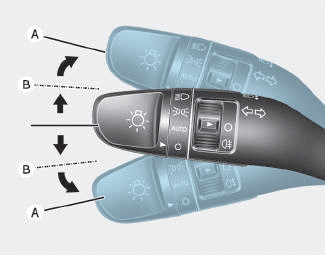Hyundai i-30: Suspension System (NON-ECS) / Front Suspension System
Hyundai i30 (PD) 2018-2025 Service Manual / Suspension System (NON-ECS) / Front Suspension System
 Troubleshooting
Troubleshooting
Troubleshooting
Symptom
Possible cause
Remedy
Hard steering
Improper front wheel alignment
Excessive turning resistance of lower arm ball joint
Low tire pressure
No power assist
Correct
Replace
Adjust
Repair and replace
Poor return of steering wheel to center
Improper front wheel alignment
Correct
Poor or rough ride
Improper front wheel alignment
Malfunctioning shock absorber
Broken or worn stabilizer
Broken or worn coil spring
Worn lower arm bushing
Correct
Repair or replace
Replace
Replace
Replace the lower arm assembly
Abnormal tire wear
Improper front wheel alignment
Improper tire pressure
Malfunctioning shock absorber
Correct
Adjust or replace
Replace
Wandering
Improper front wheel alignment
Poor turning resistance of lower arm ball joint
Loose or worn lower arm bushing
Correct
Repair
Retighten or replace
Vehicle pulls to one side
Improper front wheel alignment
Excessive turning resistance of lower arm ball joint
Broken or worn coil spring
Bent lower arm
Correct
Replace
Replace
Repair
Steering wheel shimmy
Improper front wheel alignment
Poor turning resistance of lower arm ball joint
Broken or worn stabilizer
Worn lower arm bushing
Malfunctioning shock absorber
Broken or worn coil spring
Correct
Replace
Replace
Replace
Replace
Replace
Bottoming
Broken or worn coil spring
Malfunctioning shock absorber
Replace
Replace
Wheel /tire noise, vibration and harshness concerns are directly related to
vehicle speed and are not generally affected by acceleration, coasting or decelerating...
 Components and components location
Components and components location
Components Location
1. Front strut
assembly
2. Drive shaft
3. Steering gearbox
4. Lower arm
5. Sub frame
6...
Other information:
Hyundai i30 (PD) 2018-2025 Owner's Manual: Lane Keeping Assist (LKA) system Indicator Light. Icy Road Warning Light
Lane Keeping Assist (LKA) system Indicator Light This indicator light illuminates: [Green] When the system operating conditions are satisfied. [White] The system operating conditions are not satisfied. [Yellow] When there is a malfunction with the lane keeping assist system...
Hyundai i30 (PD) 2018-2025 Service Manual: Emergency Call (eCall) Unit
Components and components location Component Repair procedures Removal If RED LED is on, check the eCall system with the diagnostic tools...
Categories
- Manuals Home
- 3rd Generation i30 Owners Manual
- 3rd Generation i30 Service Manual
- Light bulbs
- LKA system operation
- Scheduled maintenance services
- New on site
- Most important about car
Turn signals and lane change signals

To signal a turn, push down on the lever for a left turn or up for a right turn in position (A). To signal a lane change, move the turn signal lever slightly and hold it in position (B).The lever will return to the OFF position when released or when the turn is completed.
Copyright © 2025 www.hi30.net
